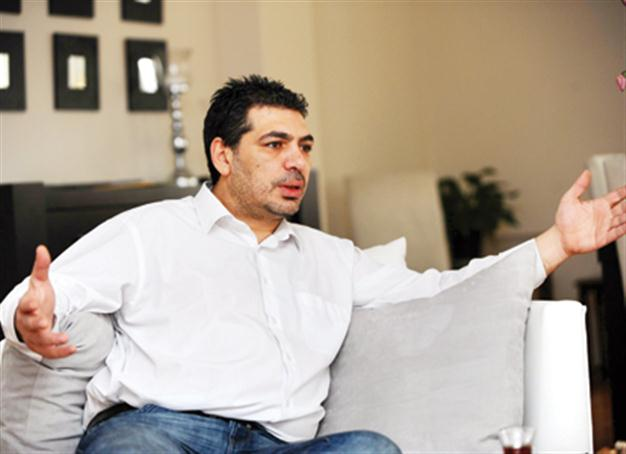Turkey's minorities still skeptical about new constitution
VERCİHAN ZİFLİOĞLU ISTANBUL - Hürriyet Daily News

Arev Cebeci, a Turkish-Armenian who was a candidate nominee for the CHP, says he doesn’t believe the new constitution will be an egalitarian one. DAILY NEWS photo, Emrah GÜREL
Representatives of Turkey’s various minority communities have expressed skepticism regarding ongoing efforts to draft a new constitution for the country.
“Considering the current political conditions in Turkey, I do not believe the new constitution will be an egalitarian one that embraces all sections of society,” Arev Cebeci, a Turkish-Armenian who became a candidate nominee for the opposition Republican People’s Party (CHP) in the most recent election, recently told the Hürriyet Daily News.
If a new constitution is drafted, then it will be the first time such a text will be produced in a democratic milieu since the establishment of the founding constitution of 1924. Other previous constitutions were written in the wake of military coups in 1961 and 1980.
“The first four articles of the 1980 constitution will be overturned in the new constitution that is underway. This will not be to Turkey’s benefit. Everyone is a Turk according to the laws of the Turkish Republic; that clause ought never to be amended,” Mari Loker-Gormenazano, a Turkish Jew, told the Daily News.
Current political conditions are not suited for making the right decisions about a new constitution, while Turkey should first concentrate on the problem of the outlawed Kurdistan Workers’ Party (PKK), said Loker-Gormenazano, the grandchild of former deputy Adolf Loker, who designed the hats for modern Turkey’s founder, Mustafa Kemal Atatürk.
“I want to see Turkey as a society [composed] of citizens of the Turkish Republic, without any regard for race, religion or language,” Loker-Gormenazano said.
Meanwhile, Cebeci also said they would never give up on rights granted to minorities through the Treaty of Lausanne in the event that the new constitution brought fresh problems regarding the status of non-Muslim minorities.
The Lausanne Treaty of 1923 granted certain rights to officially recognized non-Muslim minorities in Turkey, including the freedoms to establish and manage social, religious and charity institutions, to use their native languages and to conduct their own religious rituals.
Cebeci, however, also expressed reservations about the new Foundations Law enacted by the ruling Justice and Development Party (AKP), which received much applause from minority communities.
“For instance, in order for us to retrieve our cemeteries that are recorded in the 1936 declaration, they still need to be open to use for burial purposes. How could we still be using our cemeteries that were seized and expropriated?” Cebeci said.
Turgut Alaca, the president of Turkey’s Mesopotamia Culture and Solidarity Association (Mezo-Der), a Syriac association, also rebuffed claims about the new constitution’s benefits.
“We cannot make use of our rights, either as normal citizens or as members of a minority. We cannot teach our language to our children. Who are we? And what will change with the new constitution? I would like to ask,” Alaca told the Daily News.
“The current constitution states that all citizens of the Turkish Republic are equal, but that is not what we see in practice,” Alaca said.
“If they truly want to do something, then a new institution ought to be established instead of the Religious Affairs Directorate, such as a Supreme Board of Faith. We presented to relevant authorities in Ankara a file that was accordingly prepared. All religious faith groups must be represented under this autonomous structure,” Metin Tarhan, the founder of the Alevi Associations Federation, told the Daily News.
Tarhan said, however, that he did not believe such an institution could be founded and thus lacked trust in the new constitution and Parliament.
Despite all the pessimism and lukewarm attitude toward the new constitution, however, certain members of the Anatolian Greek and Bulgarian minorities remain hopeful.
“The new constitution is being prepared in goodwill. I have no doubts about this. I am certain this will be an egalitarian and successful constitution,” Dimitri Zotos, one of the managers of the Anatolian Greek Foundations Association (RUMVADER), told the Daily News.
“We expect freedom and democracy. Of course, everything will not be flawless, but the idea of a new constitution is a positive idea. The work is hope-inspiring,” Lüben Chalmov of the Bulgarian Community Council told the Daily News.
















